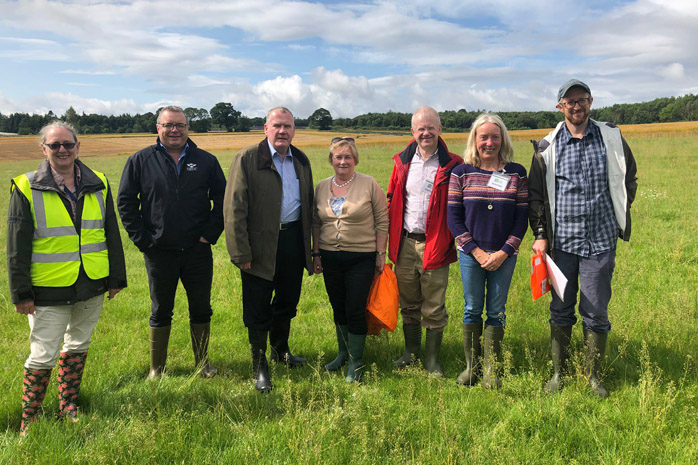MSPs given lowdown on sustainable farming

"The group, including Prof Davy McCracken, second left, met at Balruddery research farm"
Members of the Scottish Parliament’s Rural Economy & Connectivity Committee have been learning more about future sustainable agricultural policy and practices in Scotland.
MSPs recently met with scientists from the British Ecological Society’s Scottish Policy Group to discuss the committee’s work.
The Scottish Policy Group is a group of British Ecological Society (BES) members promoting the use of ecological knowledge in Scotland. They act as a focal point to provide robust ecological evidence to the Scottish Government, Scottish Parliament and wider society.
The group – consisting of Maggie Keegan (BES’s Policy Officer in Scotland), Professor Davy McCracken (Head of SRUC’s Integrated Land Management Department), Prof Rob Brooker (Chair of the Scottish Policy Group and a plant ecologist at the James Hutton Institute) and Prof Helena Black (Head of Ecological Sciences at the James Hutton Institute) – met with committee members at the James Hutton Institute’s Balruddery research farm, near Dundee.
Three members of the committee - Richard Lyle (MSP for Uddingston & Bellshill), John Mason (MSP for Glasgow Shettleston) and Maureen Watt (MSP for Aberdeen South & North Kincardine) attended the meeting together with Steve Farrell (Clerk to the Committee) and Graeme Cook from the Scottish Parliament Information Centre (SPICe).
The discussions were wide-ranging and focussed on James Hutton and SRUC research focussed on arable and horticultural systems beside the river Tay through to hill farming at the head of the catchment.
Rob Brooker highlighted how crop mixtures – with two or more crop species grown together - in the lowlands can help control pests and diseases, improve soil conditions and enable farmers to grow crops with reduced inputs and hence less impact on the wider environment.
Prof McCracken and Prof Black concentrated on issues further up the hill, describing how upland livestock systems can be managed to help deliver key ecosystem services (such as food production, flood mitigation, and carbon storage in soils and trees) while still supporting biodiversity.
Prof McCracken said: “Events like these are a great way of helping inform MSPs about what Scotland’s farmers are already doing to help make their farming systems more environmentally sustainable. Discussing these issues out in the field helps bring the topics to life and makes it much easier to unpick the sometimes complex ecological interactions involved.”
Posted by SRUC on 08/08/2019
